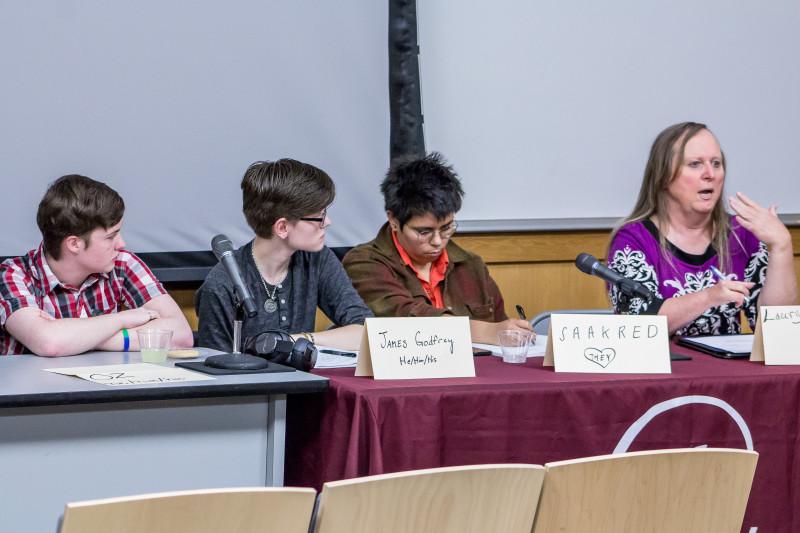On Thursday, April 16, Trinity Diversity Connection hosted the second Diversity Dialogue: “The Transgender Tipping Point.” The talk, moderated by Richard Reams, associate director of Counseling Services, hosted various panelists, including Lauryn Farris, the assistant director of Thrive Youth Center, a support center for homeless LGBTQ youth.
Farris started the discussion, noting the high rates of violence towards the LGBTQU community, including south Texas.
“The most common reasons for all youth to be on the streets is abuse and that abuse is very often even accelerated or amplified when it is LGBTQU,” Farris said. “Did you know one of the most commonly used “˜cures’ for lesbianism in south Texas is incestual rape?”
Reams expanded on the hardships faced by transgender individuals, reading a statement submitted anonymously to the panel.
“The transgender community faces a multitude of problems. Around the world it is quite literally illegal to be transgender and in Russia transgender people are considered unfit to drive.”
Again quoting from the submitted statement, Reams spoke on the issue of acceptance.
“On a smaller scale there is the issue of acceptance, it is estimated that transgender people make up 1 percent of the population. That’s a small number but that doesn’t make the issue of acceptance any less important. The constant threat of hate crimes and
violence is so prevalent that we are always seeing transgender women in the news and in television.”
The panelists continued discussing the notions of acceptance, elaborating on personal experience and the struggle of all transgender individuals.
“I think suicide is a real experience and talking about this is super emotional the experience of trans folks is one ridden with violence written on our body everyday, just getting dressed in the morning,” said Saakred, senior. Everyone deals with body issues but it’s a constant issue with being misgendered.”
Saakred continued on this notion, noting the difficulty present in a society that is not welcoming.
“If you live your day””every single day””in a world where you don’t exist, where there is no community for you to be real, to not be subhuman, you think about what your purpose is,” Saakred said. “This is definitely the future to change the idea that gender is linked to the body. Its a far out idea, but it is very real and spiritual in many ways; the spirit can be genderless.”
Reams noted that as the issue becomes more visible in society and a part of national discussion, Trinity needs to educate individuals on the issue.
“The transgender presence at Trinity is now visible in a way that it has not been in the past, and understandably there is a lot of education that needs to be done,” Reams said.
Reams explained, that while Trinity has addressed the issue, it still needs to make progressive steps in the future to raise awareness.
“I don’t know how good the awareness is. This is not the first transgender presentation that we have had. We have had several in years gone by. And it’s certainly addressed in some classes but I would say, overall, there hasn’t been any real campus-wide opportunity,” Reams said.
Reams continued on this idea, stating how we all need to become more aware of what transgender really means and how to be open and accepting.
“I hope their perception of what “˜transgender’ means will be expanded…I think all of us need to have our misperceptions enlarged to come closer to the diverse reality that there is,” Reams said.
Even with the steps made throughout the ongoing discussion, the panelists made note of difficulties they have faced, not only in general, but here at Trinity.
“Some of the most hurtful experiences I have had have been with my professors saying my name even after I have sent them a personal email,” Saakred said. “I think being as progressive as a liberal arts school like Trinity there should be some basic knowledge of pronouns and the respect of such.”
Farris explained that being transgender does not define her, although it is a critical part of how others perceive her identity.
“Being transgender is not what defines me but it is what other people use to define us,” Farris said.
Farris elaborated on the struggles facing youth today as well, stating how society must do everything it can to protect them.
“It is so important to understand the youth of today. We can build those bridges for people your age,” Farris said. “We just can’t lose another generation.”
Farris noted the misconception regarding transgender individuals and issues of choice.
“That misconception that you’re just choosing it, for some devious reason or just because you’re making that choice, really? These folks have already talked about the fact that not only is it now a choice, sometimes you get misgendered and you start questioning yourself,” Farris said. “You just want to be normal. How can I not get into that difficult, hurtful situation where I’m like this?”
To panelist and sophomore Oz LaBelle, the notion of gender is something one makes it, and not something that individuals should worry about conforming around.
“You don’t have to conform to anything. Because the thing about gender that’s great is that we make it. Gender is a human thing: we have made gender. So gender can be anything that we want it to be. And that should be ok,” LaBelle said. “You can identify as male and love to wear dresses and makeup and wear sweet heels and look hella fine.”







